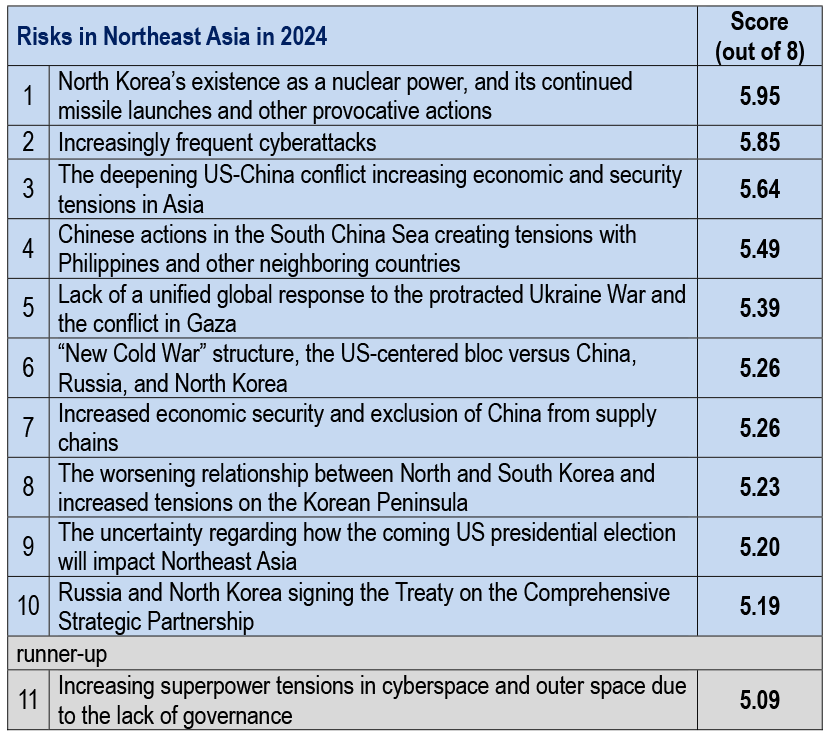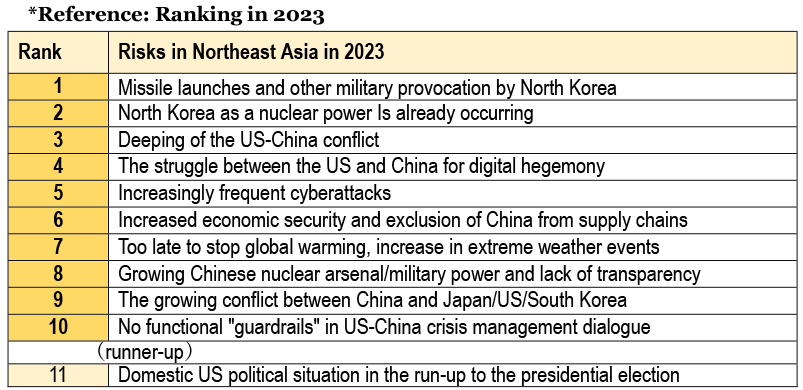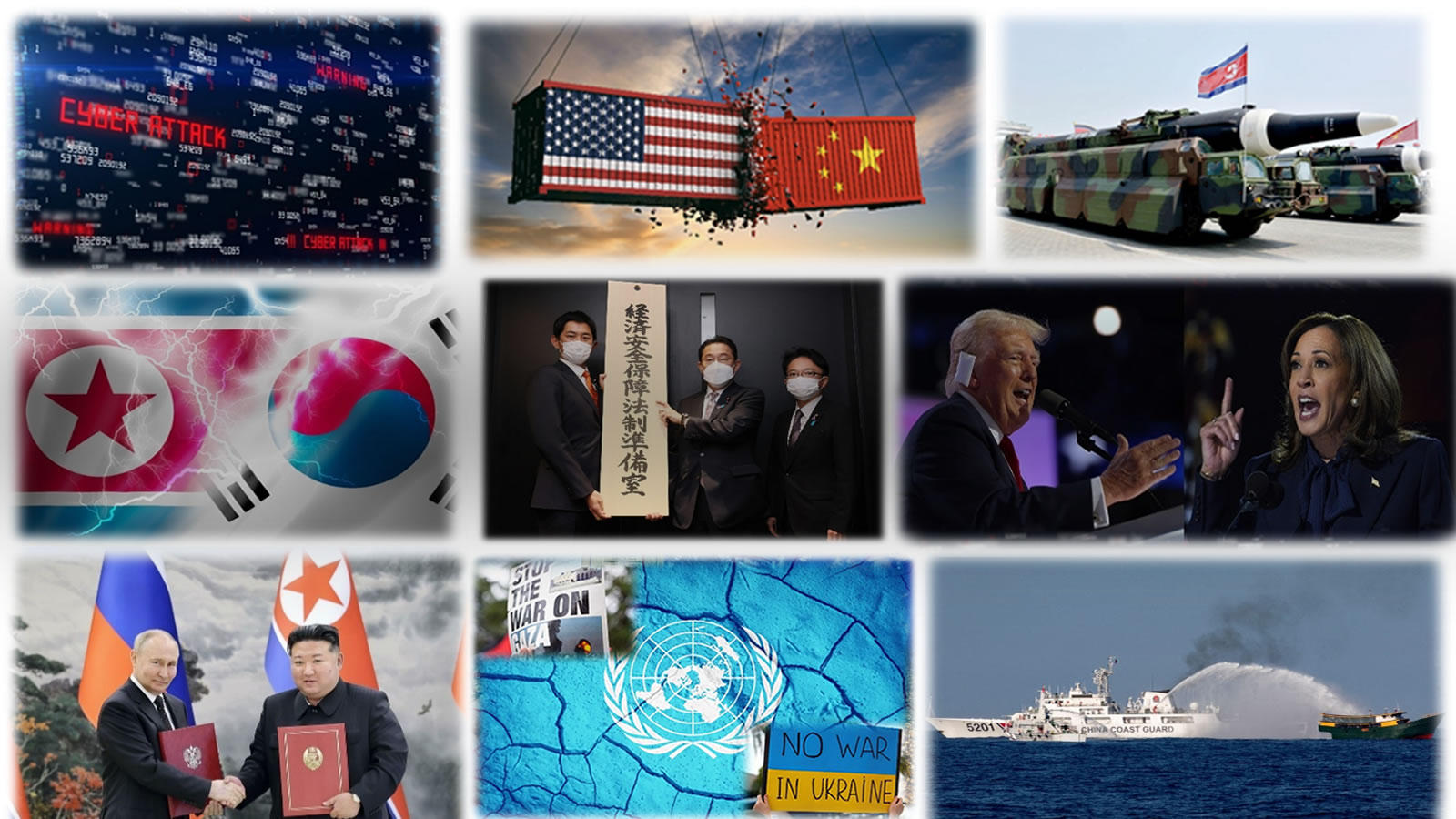― As evaluated by 161 diplomacy and security experts from Japan, the US, China, and South Korea ―
Between July 12 and August 22 2024, The Genron NPO conducted a survey of diplomacy and security experts from Japan, the US, China, and South Korea on the top ten risks threatening the peace in Northeast Asia. The experts, numbering 161 in total, scored each threat based on two criteria. The results of the survey are published here under the title, Top 10 Risks Threatening Peace in Northeast Asia in 2024.
The biggest threat to peace in Northeast Asia in 2024 is the Korean Peninsula
This year the experts found that the greatest threat to peace in the region this year is the situation on the Korean Peninsula.
The experts gave the item titled "North Korea's existence as a nuclear power and its continued missile launches and other military provocations" a score of 5.95 (out of 8 points maximum), putting it at number one for the second year running. However, a new item entered the top ten this year. "The emergence of a "New Cold War" structure between the US-centered bloc formed with Japan and South Korea on one side and China, Russia, and North Korea on the other" came in third place with a score of 5.26 points. "Russia and North Korea signing the Treaty on the Comprehensive Strategic Partnership, elevating their relationship to a military alliance" received a score of 5.19, putting in tenth place. These scores are evidence that the experts have their eyes on the current conflict structure on the Korean Peninsula.
In eighth place with 5.23 points, the experts selected "The worsening relationship between North and South Korea and increased tensions on the Korean Peninsula," meaning that for the first time, of the top ten threat, four of them were related to the Korean Peninsula.
Analyzing the results by country, we find that Korean experts gave relatively higher scores to these four items, illustrating that a stronger sense of crisis exists among them. In contrast, Chinese experts gave these items relatively low scores.
The US-China conflict is growing on many fronts, including in the military, economic, and cyberspace areas
Another element of this year's survey that stands out is the conflict between the US and China, which is expanding not only in the military sense, but on multiple fronts, from the economy to cyberspace.
This can be seen in the fact that items related to the conflict received high scores in all four countries, with "The deepening US-China conflict increasing economic and security tensions in Asia" in third place with 5.64 points, "Increased economy-based security and exclusion of China from supply chains" in sixth at 5.26 points, and "Increasingly frequent cyberattacks" in second place with 5.85 points.
Experts from China, Japan, and the US are very aware that this multifaceted exacerbation of the US-China conflict is posing a risk to the region.
However, like last year, Chinese experts expressed their concern about Japanese military expansion and US influence on Japanese foreign policy, and there these two items were the highest scoring.
Sudden emergence of threats in the South China Sea
Related to the US-China Conflict, the survey found that the fourth greatest risk to peace in the region was "Chinese actions in the South China Sea creating tensions with Philippines and other neighboring countries," which rose suddenly into fourth place with 5.49 points.
There is a particularly high sense of urgency regarding the South China Sea among US and Japanese experts, among whom that area was selected as posing the number one threat to regional peace. In last year's survey, the South China Sea didn't even enter the top twenty-five in the initial questionnaire conducted on Japanese experts, so it wasn't included in the final survey conducted in all four countries. This suggests that concerns over the risks posed by events in the South China Sea have risen quickly over the previous year.
Regarding the Spratly Islands, the conflict between China and the Philippines is growing as both claim sovereignty over them. At one point, the two countries reached an agreement to lower tensions in those waters, but coast guard vessels from the two countries continue to clash regularly. Due to increasing tension with China, Philippines has deepened defense cooperation with the US and Japan.
Japanese and South Korean experts more concerned about US election than the US and China
The US presidential election set for this fall entered the top ten this year with "The uncertainty regarding how the coming US presidential election will impact Northeast Asia" receiving 5.20 points and being ranked in ninth place by the experts.
The scores were particularly high in South Korea and Japan, both of which are US allies, with this item receiving 5.90 points from South Korean experts, and 5.62 points from Japanese experts. In comparison, the item received only 4.72 points in China, and only 4.57 in the US, where the election will take place, illustrating that there are very different levels of concern in the four countries.
Risks related to Taiwan fall out of the top ten
Two years ago, issues connected to Taiwan were seen as posing the biggest threats to peace in the region, but like last year, those items have fallen out of the top ten.
A "Taiwan emergency" received 4.28 points among the four countries, dropping it two places from last year to 23rd place. Concerns over "an incident occurring in the Taiwan Strait" are also comparatively low, with that item receiving 4.74 points and keeping it in 18th place. The reason for this is that while the experts from all four countries agree that the impact of any such conflict would be severe, the chance of one occurring in 2024 was deemed to be low.
China remains wary of the new Taiwanese president and the independence movement in the country, but since Lai Ching-te's election, there has been no open signs of conflict, and dialogue has resumed between the US and China with a series of talks between defense officials and military personnel from both countries.



Post a comment